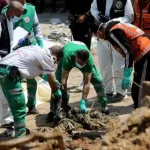According to a leaked internal letter, a prominent American daily tells its journalists not to use terms like “massacre,” “occupied territories,” or “refugees” in their reporting on Israel’s invasion of Gaza. The Intercept provides this information.
The New York Times had secret editorial guidelines dictating how its journalists should cover Israel’s invasion of Gaza. This revelation, made public by a startling leak discovered by The Intercept, an American investigative news organization, has sparked a debate about media bias and the role of journalism in influencing public perception.
The memo was originally distributed in November 2023 and has since been revised on a regular basis in light of Israel’s ongoing war of Gaza, which began in October of last year, according to a report published on Monday by The Intercept. It was written by Times standards editor Susan Wessling, foreign editor Philip Pan, and their deputies.
The guidelines advise against using terminology like “refugee camps,” “ethnic cleansing,” “occupied territory,” and “genocide,” despite the fact that the UN recognizes up to eight camps for refugees within confined Gaza.
Importantly, the Israeli government has persistently demonstrated resistance to the historical fact that Palestinians continue to be recognized as refugees, a classification that emphasizes their expulsion from areas from which they assert a right of return.
“Is it clear to us why we are using those phrases in one scenario and not another? As usual, the email emphasizes that “we should prioritize accuracy and precision — explain what transpired instead of assigning a label.”
The memo also advises writers to avoid referring to individual attacks as “fighters” and instead use the term “terrorist,” which is used inconsistently throughout the document, as The Intercept’s analysis reveals, highlighting NYT’s bias in favor of Israel’s view of the conflict.
An obvious disparity
The leaked letter states that the term “Palestine” should not be used frequently, unless there are special circumstances, such historical allusions or noteworthy political events acknowledged by international organizations.
The New York Times, Washington Post, and Los Angeles Times all covered the conflict from October 7 through November 24. The study was published in January by The Intercept. This study focused on the first few weeks of the conflict, before The revised York Times’ revised editorial policies went into effect.
The Intercept discovered a striking disparity in terminology: words like “slaughter,” “massacre,” and “horrific” were rarely used when reporting on Palestinian casualties as a result of indiscriminate Israeli airstrikes, but were frequently used to describe incidents involving Israeli casualties brought on by Palestinian fighters.
The analysis showed that, until November 24, The New York Times had called Israeli deaths a “massacre” 53 times, whereas Palestinian deaths had only been called that once.
The phrase “slaughter” was used 22 times more frequently in descriptions of Israeli deaths than Palestinian deaths, demonstrating the dramatic difference in usage. This was the case even though the number of Palestinian casualties—roughly 15,000 civilians at that point—was steadily increasing.
flagrant inconsistency in standards
“It is accurate to use ‘terrorism’ and ‘terrorist’ in describing the attacks of October 7, which included the deliberate targeting of civilians in killings and kidnappings,” according to a leaked memo from the Times.
Even in cases where the Times does not refer to Israel’s frequent attacks on Palestinian people and protected civilian sites, such hospitals, as “terrorism,” it does not call such attacks “terrorism.”
The document continues: “When possible, avoid the term and be specific (e.g. Gaza, the West Bank, etc.) as each has a slightly different status.”
According to the Times source, who was quoted by The Intercept, staying away from the term “occupied territories” tends to hide the true nature of the conflict and support the official narrative of Israel.
The source told The Intercept, “You are basically taking the occupation out of the coverage, which is the actual core of the conflict.” “It’s like, ‘Oh let’s not say occupation because it might make it look like we’re justifying a terrorist attack.'”
SOURCE: TRTWORLD






